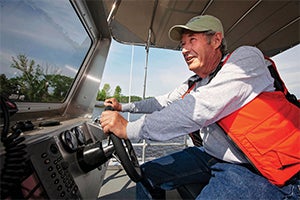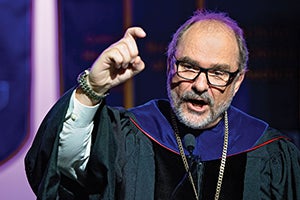Faculty Focus: Alex Manda
Thomas Harriot College of Arts and Sciences
Professor of geological sciences
Alex Manda is seeking the source of saltwater intrusion in eastern North Carolina farmland.
A hydrogeologist and associate professor of geological sciences at East Carolina University, Manda wanted to know how hurricanes may have impacted farmers in the region. They were reporting increased salt in the soil that led to patches where crops wouldn’t grow. So two years ago, with the assistance of a $45,000 National Science Foundation RAPID grant, Manda and his students took field samples to identify the source of the salinity.
After his grant ended, Manda continued evaluating the saltwater intrusion with Stephen Moysey, geological sciences professor and director of the ECU Water Resources Center. To better understand the dynamics of the intrusion, they are mapping the extent of saltwater beneath a field in Hyde County.

Alex Manda
“Saltwater intrusion is commonly mapped and monitored using a collection of wells outfitted with groundwater monitoring instrumentation like water level and salinity sensors. While this data is critical for saltwater intrusion studies, well measurements represent point data and can fail to capture the full complexity in subsurface salinity conditions,” Manda said.
To compensate, Manda and his team used electrical and electromagnetic tools to detect and delineate saltwater-intruded regions. These tools are “sensitive to changes in subsurface conductivity, often caused by changes in groundwater salinity,” he said.
Saltwater intrusion has been linked to sea level rise caused by climate change, but scientists aren’t sure how the salt winds up in fields. There are a few hypotheses, including wind pushing salt water from the area’s canals and ditches into farmland or storm surge events dumping salty water on agricultural land.
As a Fulbright scholar, in 2019 Manda spent eight months in his native Zambia studying the potential contamination of groundwater in the suburbs around the capital of Lusaka and was there again earlier this year.
-Lacey Gray






